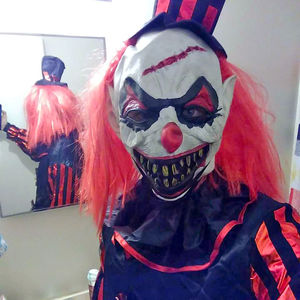This story was written by Jason Farmer, originally published in The Sylva Herald.

The clown costume worn by Turner. Photo taken from The Sylva Herald.
When Patrick Turner stood next to Old Cullowhee Road in a red-haired clown costume and waved at passing cars, he said he had no idea mass hysteria would ensue.
Turner, a 22-year-old senior at Western Carolina University, said he did it for fun and had no intent of triggering panic. After buying the clown costume online for a Halloween party, he said, he put it on to scare his neighbors. Then, he decided to stand next to the road alongside his Cullowhee apartment.
Posts on social-media erupted shortly after, on Oct. 3. Photographs of Turner dressed as a clown flooded news feeds, including Twitter, Facebook and Snapchat.
Rumors of clown sightings on and near campus spread: “Students were leaving their dorms with ladders from their beds, going out to search for clowns,” WCU student Haley Smith said. That night, several students said they feared for their life after word spread that a clown on campus had stabbed a student.
WCU Public Safety officials sent out campus-wide emails informing students that there were no confirmed sightings of a clown on campus and no reports of injuries. University officials told students to stop searching for people dressed as clowns.
“I was just standing outside dressed like a clown,” Turner said. “I knew there was going to be a reaction out of it, but I didn’t realize how fast social media was going to get ahold of it, and throw it in a different direction – of how there was a stabbing on campus and how there were clowns scaring people,” he said. “I didn’t do that, and I wasn’t doing that. I literally was waving to people, being harmless.”
The Jackson County Sheriff’s Office arrived at Turner’s doorstep a few hours later. Turner, however, was in class and, later, at work.
Following the incident, WCU’s Dean of Students, Keith Koett, threatened to suspend Turner from the university, according to Turner.
“The university cannot comment about any specific situation it may or may not be investigating while that review remains underway,” WCU spokesman Bill Studenc said in an email. “However, the code of student conduct applies to the behavior of students on or off campus. Along with some examples of off-campus conduct that might be addressed, the code specifies that ‘the director of student community ethics and associate vice chancellor/dean of students shall determine if behavior(s) off-campus affect(s) university interests and fall(s) within the scope of the code.’
“While we cannot speak to this particular student or situation, it is not uncommon for off-campus behavior to have an impact on the campus community in some fashion, and in turn result in allegations of a violation of the code.”
Turner is majoring in forensic science and minoring in history. He hopes to graduate in December.
Hysteria over clown sightings follow recent incidents in Greenville County, South Carolina. In August, it was reported that groups of clowns were trying to lure children into the woods. Since then, there has been a spike in clown sightings.
Last week, there were reports of a clown at James Madison University in Harrisonburg, Virginia. Several students responded by roaming campus with flashlights and pepper spray hoping to capture a clown or chase it off.
The clown frights are just a couple of hundreds that have surfaced recently at schools across the country, forcing institutions to respond to growing national hysteria.


